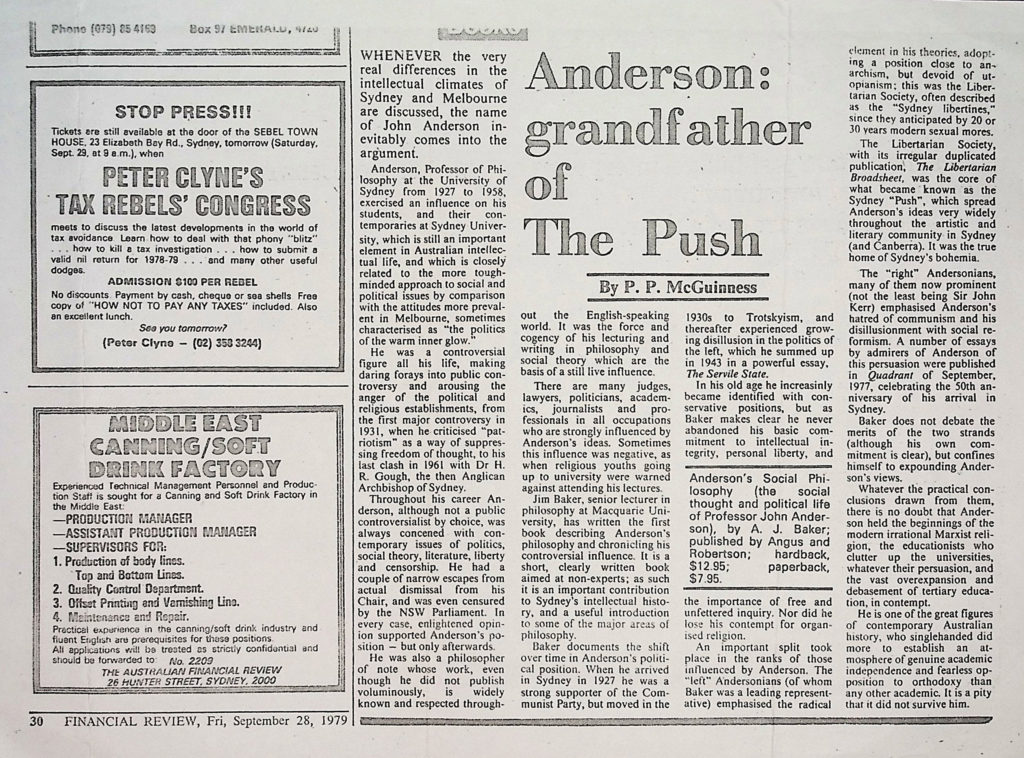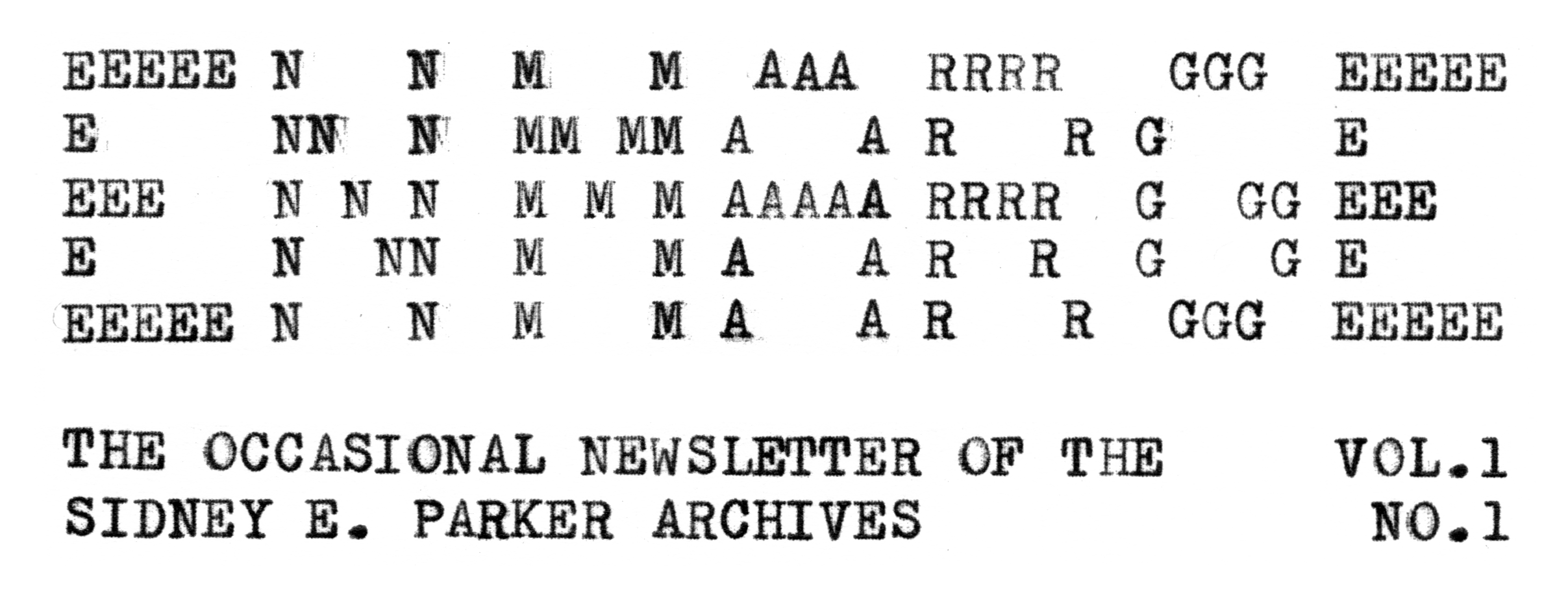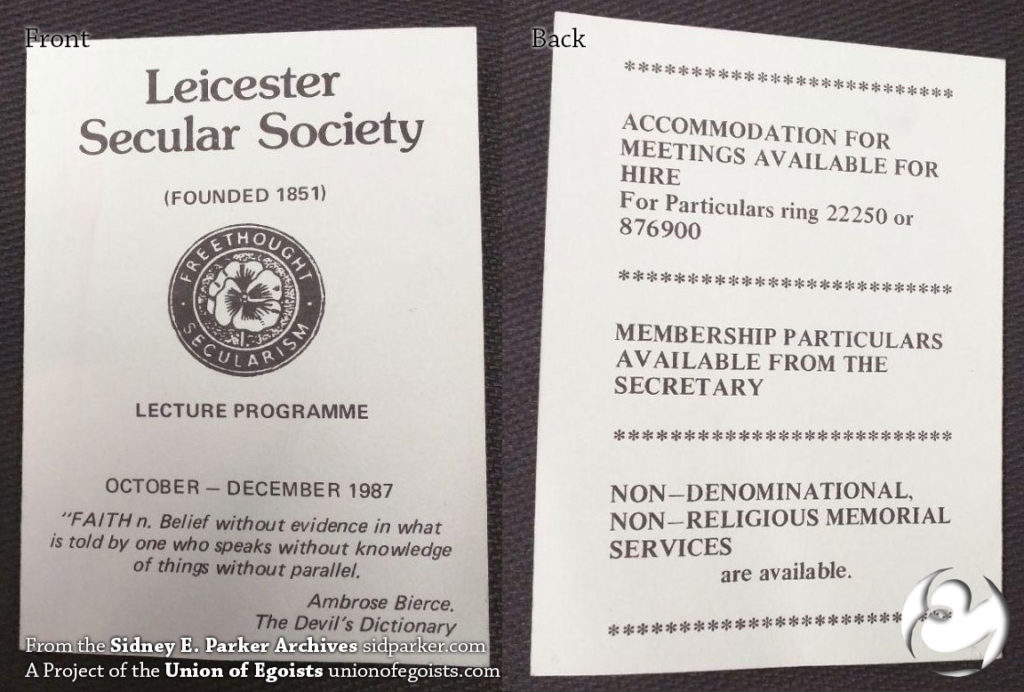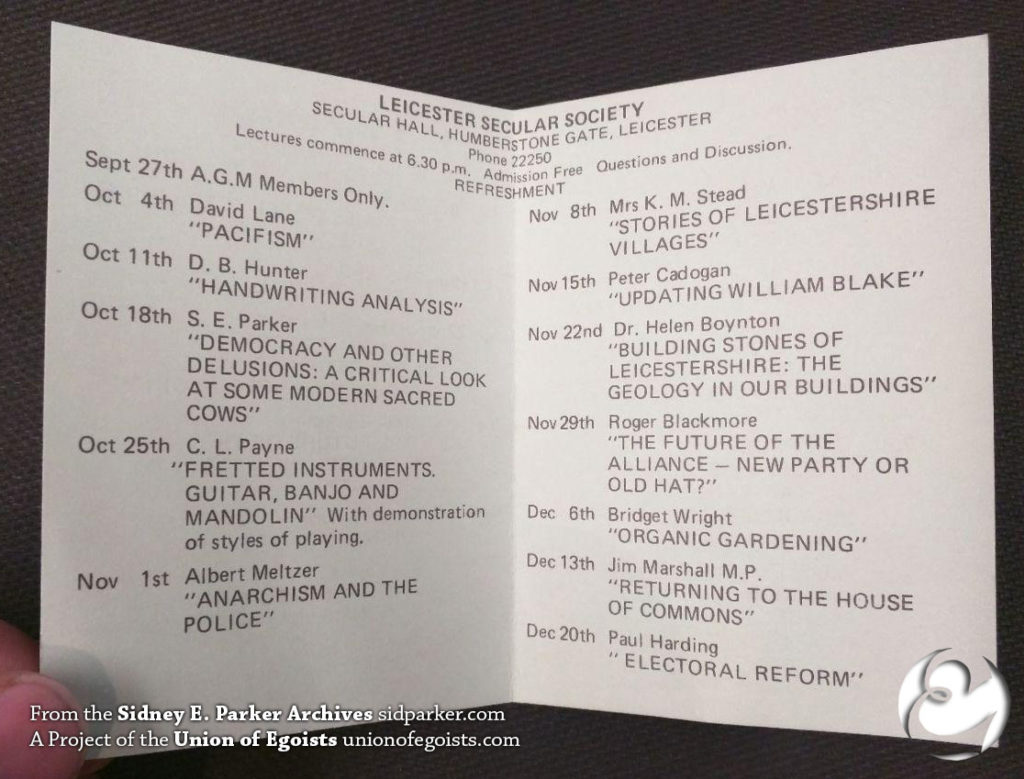The following article was published in the Australian newspaper Financial Review of Friday September 28, 1979. A photocopy was in the Sidney E. Parker archives, and McGuinness was among one of the folks part of a London Union of Egoists that centered around Parker. Though this item is not by Parker (nor does it even mention him), as a part of his papers, and the work of a friend, we decided to transcribe it for the blog.

Anderson: grandfather of The Push
By P. P. McGuinness
Anderson’s Social Philosophy (the social thought and political lite of Professor John Anderson), by A. J. Baker; published by Angus and Robertson; hardback, $12.95; paperback, $7.95.
WHENEVER the very real differences in the intellectual climates of Sydney and Melbourne are discussed, the name of John Anderson inevitably comes into the argument.
Anderson, Professor of Philosophy at the University of Sydney from 1927 to 1958, exercised an influence on his students, and their contemporaries at Sydney University, which is still an important element in Australian intellectual life, and which is closely related to the more tough-minded approach to social and political issues by comparison with the attitudes more prevalent in Melbourne, sometimes characterised as “the politics of the warm inner glow.”
He was a controversial figure ail his life, making daring forays into public controversy and arousing the anger of the political and religious establishments, from the first major controversy in 1931, when he criticised “patriotism” as a way of suppressing freedom of thought, to his last clash in 1961 with Dr H. R. Gough, the then Anglican Archbishop of Sydney.
Throughout his career Anderson, although not a public controversialist by choice, was always concerned with contemporary issues of politics, social theory, literature, liberty and censorship. He had a couple of narrow escapes from actual dismissal from his Chair, and was even censured by the NSW Parliament. In every case, enlightened opinion supported Anderson’s position — but only afterwards.
He was also a philosopher of note whose work, even though he did not publish voluminously, is widely
known and respected throughout the English-speaking world. It was the force and cogency of his lecturing and writing in philosophy and social theory which are the basis of a still live influence.
There are many judges, lawyers, politicians, academics, journalists and professionals in ail occupations who are strongly influenced by Anderson’s ideas. Sometimes this influence was negative, as when religious youths going up to university were warned against attending his lectures.
Jim Baker, senior lecturer in philosophy at Macquarie University, has written the first book describing Anderson’s philosophy and chronicling his controversial influence. It is a short, clearly written book aimed at non-experts; as such it is an important contribution to Sydney’s intellectual history, and a useful introduction to some of the major areas of philosophy.
Baker documents the shift over time in Anderson’s political position. When he arrived in Sydney in 1927 he was a strong supporter of the Communist Party, but moved in the 1930s to Trotskyism, and thereafter experienced growing disillusion in the politics of the left, which he summed up in 1943 in a powerful essay, The Servile State.
In his old age he increasingly became identified with conservative positions, but as Baker makes clear he never abandoned his basic commitment to intellectual integrity, personal liberty, and the importance of free and unfettered inquiry. Nor did he lose his contempt for organised religion.
An important split took place in the ranks of those influenced by Anderson. The “left” Andersonians (of whom Baker was a leading representative) emphasized the radical element in his theories,
adopting a position close to anarchism, but devoid of utopianism; this was the Libertartan Society, often described as the “Sydney libertines,” since they anticipated by 20 or 30 years modern sexual mores.
The Libertarian Society, with its irregular duplicated publication The Libertarian Broadsheet, was the core of what became known as the Sydney “Push”, which spread Anderson’s ideas very widely throughout the artistic and literary community in Sydney (and Canberra). It was the true home of Sydney’s bohemia.
The “right” Andersonians, many of them now prominent (net the least being Sir John Kerr) emphasised Anderson’s hatred of communism and his disillusionment with social reformism. A number of essays by admirers of Anderson of this persuasion were published in Quadrant of September, 1977, celebrating the 50th anniversary of his arrival in Sydney.
Baker does not debate the merits of the two strands (although his own commitment is clear), but confines himself to expounding Anderson’s views.
Whatever the practical conclusions drawn from them, there is no doubt that Anderson held the beginnings of the modem irrational Marxist religion, the educationists who clutter up the universities, whatever their persuasion, and the vast overexpansion and debasement of tertiary education, in contempt.
He is one of the great figures of contemporary Australian history, who single-handed did more to establish an atmosphere of genuine academic independence and fearless opposition to orthodoxy than any other academic. lt is a pity that it did not survive him.


